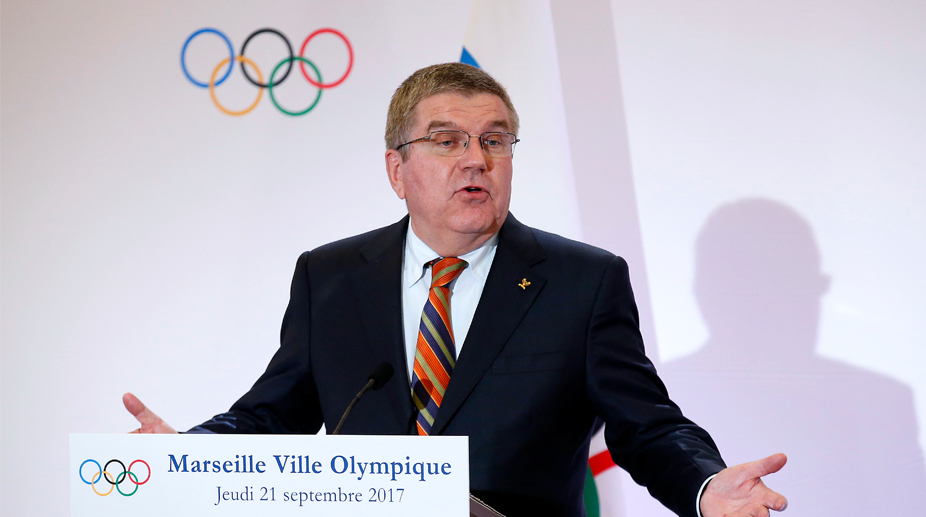Top North Korean leader calls for bolstering Navy’s combat power
The top leader of the Democratic People's Republic of Korea (DPRK) called for bolstering up the navy's combat power while inspecting the country's major shipyards
Stoss: “If the situation worsens and the security of our athletes is no longer guaranteed, we will not go to South Korea”

IOC President Thomas Bach (Photo : AFP)
Austria and Germany joined France in raising the spectre of staying away from the 2018 Winter Olympics in South Korea amid security fears over nuclear-armed North Korea.
Despite efforts by the International Olympic Committee to calm the jitters, winter Olympic powerhouse Austria said it was prepared to envisage staying away from the Pyeongchang Games next February if security concerns deepened.
Advertisement
Karl Stoss, head of Austria’s national Olympic committee, said that “if the situation worsens and the security of our athletes is no longer guaranteed, we will not go to South Korea.”
Advertisement
Stoss’ comments follow those by France’s Sports Minister Laura Flessel, who warned Thursday: “If this gets worse and we do not have our security assured, then our French team will stay here.”
The absence of Austria and other leading winter sports powers would be a hammer blow to the Pyeongchang Games.
Austria alone took home 17 medals from the previous Winter Olympics Sochi Games in 2014 and has been the dominant force in alpine skiing and ski jumping.
A more muted response came from Germany, another winter sports heavyweight that tops the all-time Olympic medal table in biathlon, luge and bobsleigh, and whose team won 19 medals in Sochi including eight golds.
The security question and the possibility of keeping the German team at home would be addressed “in good time” by the government, the National Olympic Committee and security authorities, the German interior ministry said subsidiary SID.
French sports minister Flessel, a five-time Olympic medallist in fencing, was the first leading politician to publicly cast doubt over a country’s participation at the Olympics which run from February 9-25 in Pyeongchang which is situated just 80km (50 miles) from the heavily-fortified frontier with North Korea.
– ‘No Plan B’ –
On Friday, the IOC issued a statement aimed at calming security fears amid escalating tensions over bellicose North Korea’s recent nuclear test and missile launches.
“Athletes safety and security are of course a primary concern for the IOC,” the statement said.
“We are in close contact with the heads of government concerned and the United Nations over the past months and there, in none of the discussions, has anybody expressed any doubt about the Olympic Winter Games 2018.”
“We continue to monitor the situation on the Korean Peninsula and the region very closely. We are working with the Organising Committee on the preparations of these Games which continue to be on track.”
IOC president Thomas Bach sought personally to downplay security fears 10 days ago, and a day earlier a confident IOC spokesman insisted: “There is no plan B”.
However, the situation has since deteriorated, sparking concern among some countries while others say they are preparing for the event as normal.
Sweden’s sports minister Annika Standhall, speaking to news agency TT, said it was “very worrying that some countries are imagining not to taking part…” while neighbour Norway said normal preparation were under way.
Italy said they had been reassured by IOC chief Bach’s statement on security and were looking forward to a “safe and secure” Olympics while Dutch Olympic Committee spokesman Geert Slot said growing tension on the Korean peninsula was a factor but saw no reason “as things stand at the moment” to follow the French example.
The United States Olympic Committee chief executive Scott Blackmun said moving forward as planned and have confidence in Pyeongchang’s organizing committee.
“The United States Olympic Committee is very much looking forward to the Winter Olympics in Pyeongchang, and will participate in the upcoming lighting of the Olympic Flame in Olympia to celebrate the approaching Games,” Blackmun said in a news release. “Our preparations continue in earnest and, as with all Games, we will continue to work with our state department and local organizers to ensure that our athletes, and our entire delegation, are safe.
“We are confident in the Pyeongchang organizing committee’s ability to deliver a great Games.”
Canada, who won 10 gold medals at Sochi four years ago and have claimed 13 Olympic ice hockey titles, also played down the risks.
“The safety of our entire Canadian Olympic team is always our main priority, no matter where the Games are held,” said Canadian Olympic Committee (COC) spokesman Photi Sotiropoulos.
“The COC and the Royal Canadian Mounted Police (RCMP) have representatives in South Korea and have routinely done site visits to the country.
“The government of Canada does not currently have travel advisories in place for South Korea and recommends that Canadians exercise normal security precautions, which is the lowest of four risk levels.
Advertisement